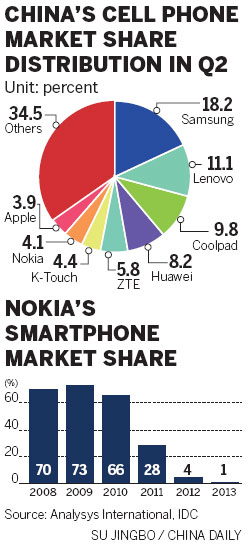|
On Tuesday, Microsoft said it would pay 5.44 billion euros ($7.18 billion) to buy patents. Provided to China Daily |
But fierce competition means it's a tough call for buyer Microsoft
Microsoft Corp's acquisition of Nokia Corp's mobile business is not likely to introduce a real comeback for the

Finnish company in the world's smartphone industry, especially in the Chinese market, where competition is harsh.
On Tuesday, Microsoft said it would pay 5.44 billion euros ($7.18 billion) to buy Nokia's mobile phone business and related patents. As part of the deal, Microsoft will bring aboard 32,000 Nokia employees including the company's Chief Executive Officer Stephen Elop.
The joint announcement by Microsoft and Nokia has definitely aroused acute interest in China, where Nokia boasts having more than 250 million users. The nation is still Nokia's biggest market and is the world's biggest Windows Phone market.
Nokia had a more than 70 percent share in China's smartphone market in 2009. It now struggles maintaining a mere 1 percent share as of June, according to International Data Corp. The company was overtaken by Samsung Electronics Co Ltd, as well as by local players such as Huawei Technologies Co Ltd and Lenovo Group in recent years.
Flann Gao, head of communications for Nokia China, said on Tuesday there is no news about specific changes in Chinese management, staff and facilities.
"Microsoft's purchase of Nokia is not likely to change Nokia's worldwide performance in the short term because the mobile phone maker's overall strategy is not undergoing a big shift," said Sandy Shen, a telecom analyst with Gartner Inc.
"Whether Nokia will make a real comeback is dependent on stronger software support from Microsoft," Shen said. She added Microsoft's Windows Phone mobile platform failed to deliver a superior performance and needs to improve.
Two years after Nokia tied the knot with Microsoft in 2011 to produce smartphones based on the Windows Phone mobile operating system, analysts said the alliance has yet to bear much fruit. According to Canalys, the Windows Phone platform gained a 3 percent market share in the world's mobile operating system market, far behind Google Inc's Android system and Apple Inc's iOS platform.
